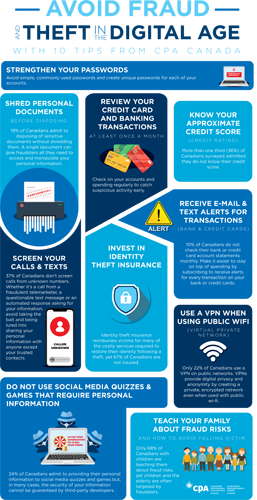5 ways to avoid fraud in the digital age

March is Fraud Prevention Month in Canada. CPA Canada releases fraud survey
TORONTO, Mar. 4, 2020 – As March is Fraud Prevention Month in Canada, the timing is right to assess how effectively Canadians are protecting themselves online, according to Chartered Professional Accountants of Canada (CPA Canada). "With more of our daily activities going online, the ability of fraudsters to take advantage of unsuspecting Canadians increases," explains Doretta Thompson, CPA Canada's Financial Literacy Leader. "Devices such as smart locks, home security cameras, laptops and even smart TVs can be infiltrated and compromised with access to the right information."
Fraud Prevention Month, now in its 15th year, was launched this week by the Competition Bureau of Canada, the Canadian Anti-Fraud Centre and the Canada Revenue Agency. As each year of the digital age advances, many Canadians are using unsafe and outdated techniques to protect themselves and their personal data online, with 34 per cent having personally experienced fraud. CPA Canada's annual fraud survey (2020) makes clear it is becoming increasingly vital to understand how to stay safe online as nearly three quarters of Canadians buy from web-based retailers (74 per cent) and conduct their banking online (74 per cent). In addition, more than two thirds share their lives on social media (70 per cent).
Password protection remains a top vulnerability when it comes to keeping Canadians' personal information secure. Among those surveyed, 60 per cent of Canadians choose to simply memorize some of their passwords, potentially leading to repetitive use of the same information which reduces security.
Protect yourself online with these tips from CPA Canada:
- Strengthen your passwords.
Creating strong, unique passwords is the first line of defense in securing your information from fraudsters. Avoid using simple, commonly used passwords and create unique passwords for each of your accounts. If you have trouble keeping track of them, consider writing your passwords down. More than one-in-five (22 per cent) of the survey respondents admit to doing this which fine as long as the information is stored in a safe location. Alternatively, you can use a password manager to create and store strong passwords. - Review your credit card and banking transactions at least once a month for illegitimate activities.
The good news is 87 per cent of Canadians surveyed review their credit card and banking transactions at least once a month, which makes it easier than ever to stay on top of spending. Make it simpler to stay on top of spending by subscribing to receive alerts for every transaction on your bank or credit cards. This is a helpful service offered by most banks to provide real-time monitoring for any suspicious account activity. - Shred personal documents before disposing of them.
Nearly a fifth of Canadians surveyed (19 per cent) admit to disposing sensitive documents without shredding them. A single document containing your name, address, or other identifying information such as birthdays or account numbers, can give fraudsters all they need to access and manipulate your personal information. - Know your approximate credit score (credit rating).
More than one third (36 per cent) of Canadians surveyed admitted they do not know their credit score. Request a credit report from Equifax or TransUnion Canada at least once a year to monitor for illegitimate activities. If you regularly shop or transact online, consider using a credit monitoring service to monitor your score proactively. - Screen your calls: don't answer a call or a text message if you don't recognize the number.
Fraudsters are always coming up with new ways to obtain your personal information and 37 per cent of Canadians don't screen calls from unknown numbers. Whether it's a call from a fraudulent telemarketer, a questionable text message or an automated response asking for your information, avoid taking the bait and being lured into sharing your personal information with anyone except your trusted contacts.
|
|
Source: CPA Canada. |





(0) Comments